News | November 13th, 2019
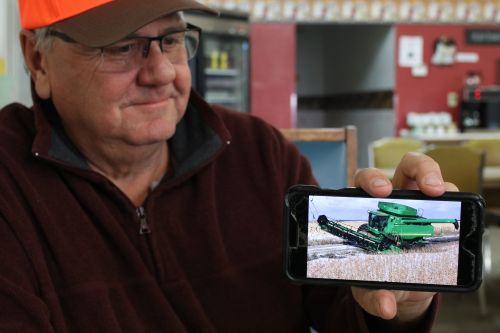
By C.S. Hagen and Sabrina Hornung
ROBINSON — On the second day of deer season hunters and farmers gathered in Carol’s Kitchen for bacon and eggs, coffee, and stories. Extreme precipitation including 14 inches of snow this autumn were still making front page news as many farmers struggle to bring their corn, soybeans, wheat, canola, and to the east sugar beets in from frozen fields.
The ground is saturated, and now rock solid. Thin ice covers a foot of water over some roads, including County Road 71, the main road Mary Lou Hanson uses from her home on the edge of Horsehead Lake.
Other stories swirled about a Wells County farmer committing suicide after losing a combine and a truck to the mud, but the Wells County Sheriff’s Department reported they have had no suicides in 2019.
Forty-seven of the state’s 53 counties have been declared secretarial disaster zones by Governor Doug Burgum, and the declaration was approved by U.S. Secretary of Agriculture Sonny Perdue early November. All counties involved can implement the Farm Service Agency’s Emergency Farm Loan Program, but many farmers don’t want loans; they want markets.
Bob Bowerman held up a picture on his cellular phone: one set of wheels on his massive John Deere combine was mired in mud so deep the entire vehicle nearly flipped. He had to dump 700 bushels of grain to get another farm vehicle out of the mud.
“I had a lot of trouble getting my stuff done,” Bowerman, a lifelong farmer and crop insurance salesman, said. “We got stuck a lot, we buried the combine a couple of times, but I got started out early and got my wheat and soybeans out.”
Bowerman is one of the lucky ones. He was able to pull his combine free with a 4x4 truck. While Bowerman showed a video of him harvesting wheat in six inches or more of water, a friend walked in for a Mr. Goodbar snack before heading back out into the snow and rain to start another day struggling against Mother Nature and a trade war that is wiping out markets for farmers.
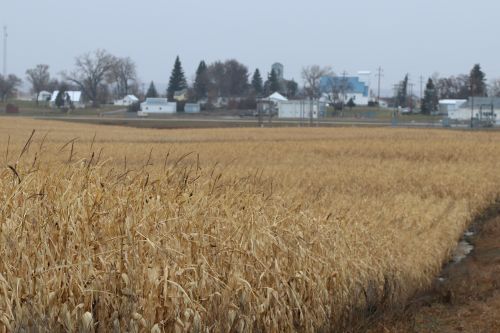
Crop quality was better than usual this year for feed corn, soybeans, wheat, and canola, Bowerman said, but the massive amounts of rain and snow and freezing temperatures nearly cost him everything. Corn still stands 10 feet tall in many areas along Highway 36. Hay is baled, but soaking in standing water and at approximately 2,000 pounds per bail, the hay grows heavier and inedible. Some soybeans — which might last a harsh winter unscathed if harvested in spring — are bowed and covered with snow.
“Cattle people can’t get hay and it was good hay, and a lot of it,” Bowerman said. “But now it’s no good because they couldn’t get it out in time. You want to have your hay all in by the first of November,” Bowerman said. “Today, there is 75 percent of that hay still out there. You have to try and get them out one way or another.
“That foot of snow we got if it hadn’t gone away we would have been in serious trouble,” Bowerman said. “And the winds blew so hard it laid the crops down.”
Marriage brought Mary Lou Hanson to her home near Horsehead Lake in 1962, she said. She’s never seen such wet conditions, and drives her Chevrolet Impala across a canola field to get home. So far this year fresh gravel has been hauled in twice to raise the road to her house, but it’s still covered in water.
“The ground is saturated and it froze up hard,” Bowerman said. “When it melts, it’s all going to run and it’s going to Mary Lou’s at Horsehead Lake.”
“I’m kinda like an ostrich sticking my head in the snow,” Hanson said. “The water just keeps rising and it isn’t going anywhere. We got problems, and there are those who have bigger problems, but there is no outlet for Horse Head Lake.”
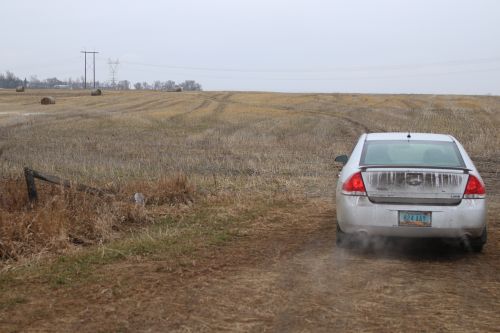
Farm bankruptcies have surged 24 percent across the nation because of Trump’s trade war with China and severe weather, according to Bloomberg and Markets Insider. Bloomberg described the recent agricultural downturn as the worst since the 1980s. Chapter 12 bankruptcies have reached their highest point since 2011. Farmers are also becoming dependent upon the billions in financial aid the Trump Administration has handed out.
“Farmers would rather have a market than a handout in my mind,” Bowerman said. “Trump says he loves farmers and the farmers believe him because he said it. But he is a New York salesman, that’s what he is. Everybody in New York lies.”
North Dakota farmers and related organizations have spent decades building trust and landing deals with China, and Bowerman believes those trade deals are gone forever.
“He keeps saying that there is a deal with China, it’s in phase one, but he lies, and this won’t be fixed overnight. That’s my view and I’ll stick with it.”
Despite the troubles farmers are facing today, many of his friends and neighbors support for Trump hasn’t withered, or at the very least, they’re not vocally condemning the current administration’s actions.
“North Dakota is pretty redneck, and it’s not gonna change,” Bowerman said.
Curt Stofferahn, a UND professor emeritus, is the Faith and Farming Task Force coordinator for the the Eastern North Dakota Synod of the Evangelical Lutheran Church (ELCA), said he hasn’t seen a recipe for disaster forming so uniquely since the 1980s Farm Crisis.
“It’s frightening, corn is standing in foot deep water they can’t harvest,” Stofferahn said. “This winter is going to compound the problems, and they’re predicting a colder than usual winter. I am not sure about precipitation and that is the thing we’re really worried about.”
During the Farm Crisis in the 1980s, the state had 40 credit counsellors. Today, there are two, Stofferahn said. His top priority is to deal with the spiritual and mental health of farmers across the state from any religious or non-religious background.
“I’m worried that farmers won’t be able to get refinanced in the spring,” Stofferahn said. “They got crops they haven’t sold, debts they can’t service, they’re not going to pencil out. We have churches and pastors in a lot of in rural areas. This is why it is so important that we’re involved, these are our members, these are our people, and if they’re hurting we need to find a way to minister to them."
Financially, there is little the task force can do to help farmers at this stage. The state needs more counsellors.
“We need credit counselors that are well versed in the provisions passed in the 1980s, and we need markets, if they can get their crops out of the bins and sell it would be a great help,” Stofferahn said. “They’re sitting on grain they can’t sell. If they try to sell it they will lose money anyway. Our immediate focus is spiritual and mental health regardless of denomination.”
Farmers in North Dakota have historically proud and resilient spirits, Stofferahn said.
“And they do internalize it,” Stofferahn said. “I’m hoping the Baby Boomer children who are in this precarious financial situation will be more willing to reach out for help. They are a different generation who are more willing to seek help, their parents and grandparents we dealt with in the 1980s internalized it all, and didn’t seek help like they should.”
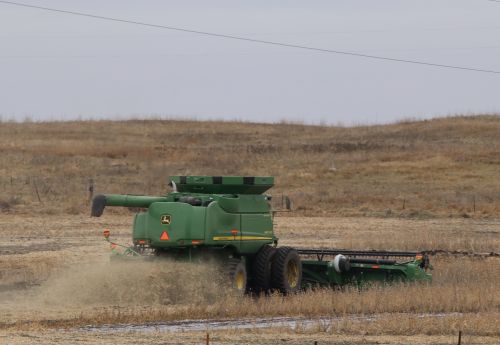
The state of Kidder County
“Our initial problem started at the end of September when we had eight inches of rain, we were already really wet but that sort of put us over the edge of everything," Kidder County Emergency Manager Jim Albrecht said. "Wells county also which neighbors to the north of us, they had eight inches of rain in three hours a lot of roads washed out up there,” He went on to say, “When everything starts going to the east it goes toward the James River, and then the other stuff goes south into Jasper Lake and Frettim Lake, it makes its way there and it flows into Horsehead Lake and that right now is the fullest it’s ever been and that has no outlet. A lot of roads around Horsehead and the area around Robinson, they’re dealing with a lot of roads underwater and a lot of them are anywhere from a foot to two foot already under.”
Rewind to approximately one month ago when the area was bombarded with over a foot of snow. Farmwork had slowed down considerably due to the snow. Then days later--despite the earth already being oversaturated they dealt with the melt. The cities of Dawson and Tappen already had high water tables and are experiencing trouble with their lift stations. Countless houses have water in their basements with their sump pumps working overtime. Roads are in need of maintenance and the cold weather has already brought roadwork to a halt until spring. Kidder County with a population of less than 2500, is in the middle of a flood emergency and is currently working on their FEMA declaration
Albrecht said, “It still won’t be for another few months out until we see any federal help at our level.” When asked what he anticipates this spring he said, “More flooding. It’s all dependent on what the weather does. If we get a lot of snow we’ll have a lot more problems.”
Crops were one thing that farmers struggled but cattle are a whole different animal. Albrecht added, “Another thing that hurts here too is, there are a lot of farmers that didn’t have their cattle home, they had to go out and find them some had cattle that had wandered. They knew that they had a blizzard coming up and they got them bedded down in the pasture. I had friends who had to haul hay 10 miles every day so they could get their cattle home. You have to get food and water to them but you also have to know that they are there and accounted for--and alive, you know what I mean?”
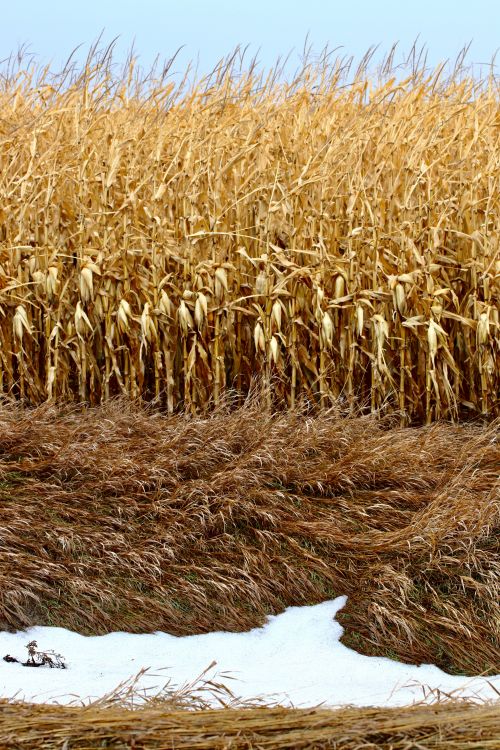
According to Albrecht, he estimates that 80-90% of the roads in Kidder county are gravel. He said, “In the wintertime in order to get the ice off, you have to peel it off and a lot of your gravel will go in the ditch. Just because you’re getting the snow and ice off the road--and then you try graveling it as you can afford it and townships are only allotted so much money based on the taxes that they take in, so they prioritize roads and try to keep enough for snow removal. These freak years where there’s so much snow and so much water that you try to do stuff--but there’s just nothing that a lot of us can do other than just wait.”
He went on to say, “We’re still functioning, everyone is still trying to do everything they can. Neighbors are helping each other. That’s one of the positive outlooks that we always have here, we’re trying and we’re not begging for anything--we’re just asking for helping hands, to help us keep going a little more and to keep us going entirely. There’s getting to be a lot of townships out here where there are just one or two farms per 36 square miles, so it’s getting to be larger and larger areas with fewer and fewer farms. It’s getting tougher.”
Jim Albrecht is getting an education on the backroads by trying to find alternative routes to ensure the safety of the rural communities in Kidder County.
“Google Earth and I are now really good friends. That’s the biggest thing--we’re trying to make sure that everybody has access into their place so EMS and fire--if they do have to, can get to a certain place, that if there are alternate routes we’re trying to let them know that there are alternate routes and sometimes they’ll just have to back up and go around the secondary place. We are still trying to make sure that every 911 call is answered and it just might take a little longer for an ambulance to make it out to your place or your father’s place, it might not be that direct route it might be four, five, six miles to get around to get into your place, or hooking up as four-wheel drive tractor to the ambulance and going through--we’ve done that before.”
July 7th 2025
June 9th 2025
April 30th 2025
April 24th 2025
April 23rd 2025
__293px-wide.jpg)

__293px-wide.jpg)


